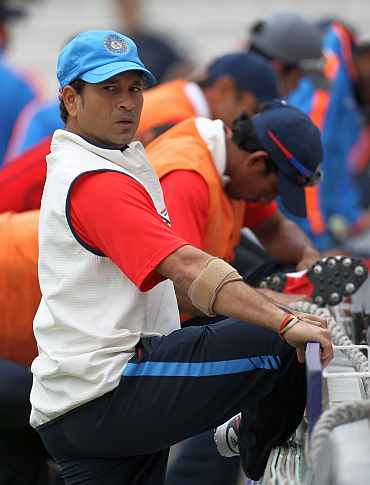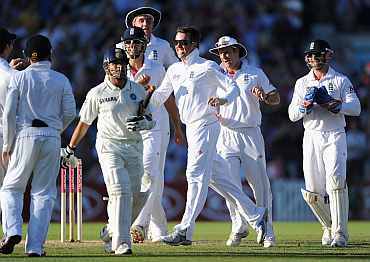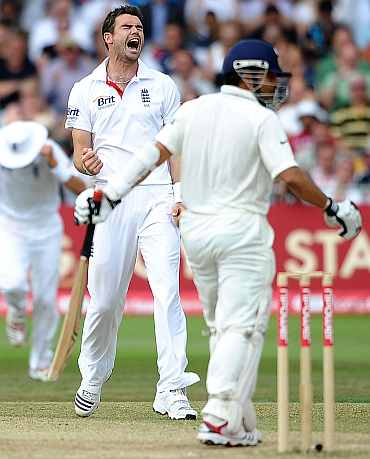 | « Back to article | Print this article |
England take mathematician's help to quiet Tendulkar
A mathematician's plan and modern technology have helped England keep Sachin Tendulkar's bat quiet in the ongoing Test series against the Indian cricket team, a reports claimed.
England has relied on drawing Tendulkar outside his offstump in the early part of his innings rather than let him get his runs on the onside and this ploy is the result of a computer simulator plan, created by team analyst Nathan Leamon.
"We feed into the simulator information about pitches and the 22 players who might play, and it plays the game a number of times and tells us likely outcomes." Leamon was quoted as saying in a British newspaper.
England believe Tendulkar largely gets his runs on the onside until he has made 50 and they have denied him the advantage completely.
Of the 261 balls bowled to Tendulkar by England's fast bowlers till the Edgbaston Test, 254 have pitched outside his off-stump, six have been in the line of the stump and just one beyond leg-stump.
Disappointing tour for Tendulkar
Tendulkar, highest run-getter ever and on the cusp of his 100th international hundred, has so far got 34,12, 16, 56, 1, 40 and 23 from seven innings for a combined total of 182 from the series at an average of 26.00.
Leamon, nicknamed "Numbers" by England players, breaks down the target area of the pitch into 20 blocks, each 100cm x15cm, in his software and bowlers begin to get a better idea of where to aim against a particular opponent.
The software records how many times a ball is pitched in each block and the resulting shot. This data is then used by England bowlers to work out the best areas to bowl to exploit each batsman's weakness.
On the basis of this data, Leamon helps England's coach and captain, Andy Flower and Andrew Strauss, to see clearly which players might do best to a certain ball in a certain situation.
"It helps us in strategy and selection. I've checked the program against more than 300 Tests and it is accurate to within 4-5 per cent."
'We have bowled brilliantly at Tendulkar'
Leamon apparently has chronicled every ball bowled in Test cricket for the past five years, dissecting to the last detail how each pitch and player perform in different circumstances and situations.
Leamon, a former Cambridge mathematician, does use video data but he makes greater use of Hawk-Eye ball-tracking system.
"It's all about asking the right questions, which can be short cut to six months of work. A lot of the old ways of looking at the technique of opponents leads to guesswork feet position, how they hold the bat. Hawk-eye enables you to come up with answers.
"We classify balls in certain ways and how opposing batsmen deal with each type. It is unusual for anyone not to have an area in which they don't have some sort of weakness.
"If the bowlers can hit the right block twice an over, it markedly increases the chance of success.
"Of all the Indian players, we have executed our plans best to Tendulkar. We have bowled brilliantly at him," he added.
Smart tactics from England
According to an insider in the Indian team, Tendulkar did work out what England were doing to him by the time the third Test match was played at Edgbaston.
Tendulkar realised that he was being made to reach out to deliveries, that the strokes he was attempting were going on the left of the cover fielder -- an indication that he was playing beyond his body.
He was getting out to catches in the slip cordon as well as leg before because his head was falling outside the line of off-stump.
In order to counter this tactics, England took a middle and leg stump guard in the second innings of the Edgbaston Test and stood outside his crease.
He thus became surer of his off-stump and his off-side strokes were now going to the right of the cover fielder.
England then tried to desist Tendulkar from following his change in batting tactics and Matt Prior immediately came up to the stumps to James Anderson to force the little master back into his crease.
Leamon, 39, was recruited by Flower shortly after he became England's coach in 2009. He is also a qualified cricket coach.



